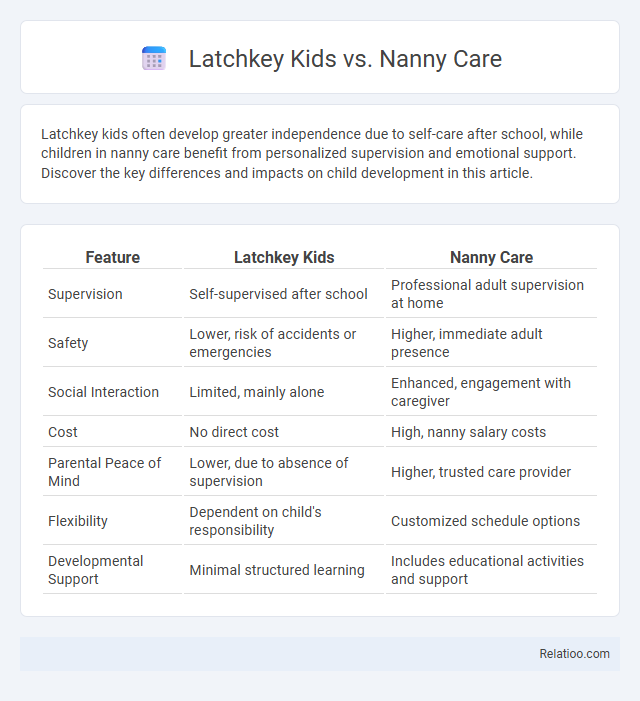Latchkey kids often develop greater independence due to self-care after school, while children in nanny care benefit from personalized supervision and emotional support. Discover the key differences and impacts on child development in this article.
Table of Comparison
| Feature | Latchkey Kids | Nanny Care |
|---|---|---|
| Supervision | Self-supervised after school | Professional adult supervision at home |
| Safety | Lower, risk of accidents or emergencies | Higher, immediate adult presence |
| Social Interaction | Limited, mainly alone | Enhanced, engagement with caregiver |
| Cost | No direct cost | High, nanny salary costs |
| Parental Peace of Mind | Lower, due to absence of supervision | Higher, trusted care provider |
| Flexibility | Dependent on child's responsibility | Customized schedule options |
| Developmental Support | Minimal structured learning | Includes educational activities and support |
Understanding Latchkey Kids: Definition and Background
Latchkey kids are children who return to an empty home after school due to parental absence, often because parents are working. This contrasts with nanny care, where a caregiver is present to provide supervision and support during after-school hours. Understanding your child's needs is essential when choosing between independent latchkey care and the structured environment offered by a nanny.
Nanny Care Explained: Roles and Responsibilities
Nanny care involves a dedicated caregiver who provides personalized child supervision, engaging in activities like meal preparation, educational support, and transportation to extracurriculars, which differs significantly from latchkey kids who typically self-supervise after school without adult presence. Nannies foster emotional development and consistent routines, ensuring safety while accommodating individual child needs, whereas latchkey care relies heavily on the child's self-management skills during unsupervised hours. This tailored approach of nanny care offers a structured environment that supports holistic child well-being beyond the basic supervision inherent in latchkey scenarios.
Emotional Impact: Latchkey Kids vs Nanny-Supported Children
Latchkey kids often experience feelings of isolation and increased stress due to lack of adult supervision, which can impact their emotional development negatively. In contrast, nanny-supported children benefit from consistent emotional support and guidance, fostering a sense of security and stronger coping skills. Your child's emotional well-being thrives with attentive care, highlighting the importance of nurturing environments over solitary after-school arrangements.
Safety Concerns: Home Alone Versus Supervised Care
Latchkey kids face significant safety concerns as they are left home alone without adult supervision, increasing risks related to emergencies, accidents, and potential intruders. Nanny care provides continuous, supervised attention that enhances your child's safety by addressing immediate needs and preventing hazardous situations. Choosing between latchkey and nanny care directly impacts your child's security, with supervised care offering a safer environment than unsupervised latchkey arrangements.
Social Development Differences
Latchkey kids often experience limited social interaction due to minimal supervision after school, which can hinder the development of critical social skills like communication and teamwork. Nanny care provides more consistent, guided social engagement, fostering better emotional support and interpersonal growth through personalized attention. Latchkey arrangements typically result in greater independence but may delay social maturity compared to the structured social opportunities present in nanny care environments.
Cost Comparison: Latchkey Kids and Nanny Care
Latchkey kids typically incur minimal costs since children care for themselves at home, whereas nanny care involves substantial expenses averaging $15 to $25 per hour, varying based on location and nanny experience. Your choice impacts your budget significantly, with nanny care providing personalized supervision but higher costs, while latchkey arrangements emphasize cost savings with potential safety concerns. Comparing costs alongside care quality helps determine the best option for your family's financial and caregiving needs.
Parental Peace of Mind: Weighing Trust and Oversight
Latchkey kids often require parents to trust their child's independence without direct supervision, which can lead to increased anxiety about safety and emergencies. Nanny care provides personalized oversight and a dependable adult presence, offering parents greater peace of mind through consistent monitoring and immediate response capabilities. Your choice between latchkey care and nanny care significantly impacts parental trust and oversight, influencing your overall confidence in your child's safety and well-being.
Academic Outcomes and After-School Support
Latchkey kids often face challenges in academic outcomes due to limited after-school supervision and support, which can hinder homework completion and learning reinforcement. Nanny care provides personalized after-school attention, fostering improved academic performance through tailored tutoring and structured activities. Latchkey arrangements lack dedicated educational support, potentially leading to lower achievement compared to children receiving consistent guidance from a nanny.
Building Independence vs Dependency
Latchkey kids often develop strong independence as they navigate after-school hours alone, fostering self-reliance and time management skills. Nanny care provides direct supervision and personalized support, which may nurture dependency if not balanced with opportunities for your child to make decisions independently. Balancing these care options can help ensure your child gains autonomy while still receiving necessary guidance.
Choosing the Right Option: Factors for Families to Consider
Choosing the right childcare option depends on factors such as your child's age, independence level, and safety needs. Latchkey kids require maturity and a secure environment, while nanny care offers personalized supervision tailored to your family's schedule. Assess your child's social and emotional development to determine whether solitary care or professional nanny support best suits your family's lifestyle and safety priorities.

Infographic: Latchkey Kids vs Nanny Care
 relatioo.com
relatioo.com